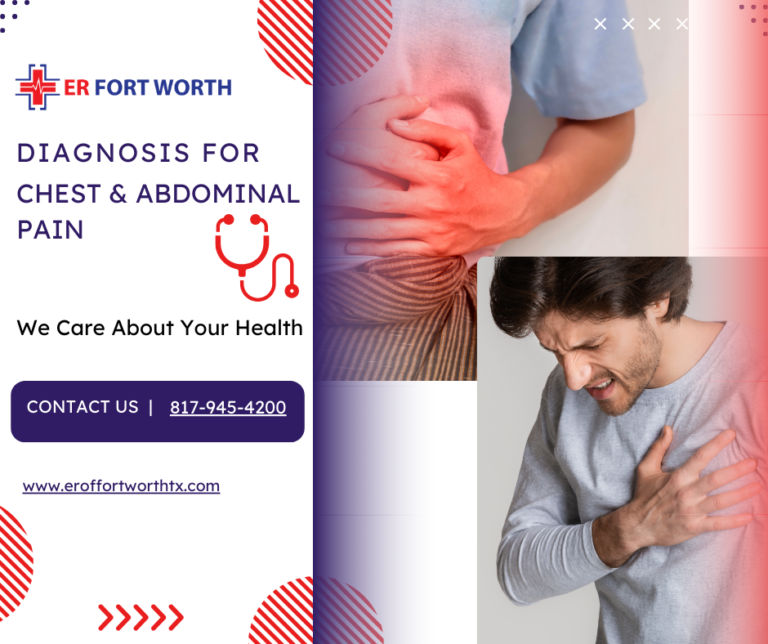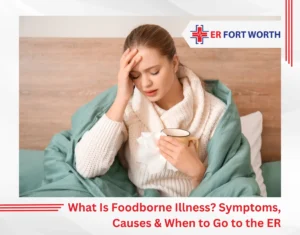Experiencing chest and abdominal pain simultaneously can be quite distressing. It’s like dealing with two different types of discomfort at once – one in your chest area and the other in your stomach region.
The combination of chest and abdominal pain makes you feel uneasy and worried. Chest pain feels tight, sharp, or heavy, while abdominal pain can be crampy, dull, or achy. Abdominal discomfort is intermittent or constant, ranging from mild to extreme. Chest discomfort often manifests as a tight, burning sensation in the upper abdomen or below the breastbone.
Most of the time, these pains are mild and can be treated at home with over-the-counter medications and natural remedies. However, if the pain is severe, it can signal a serious problem, so it’s important to seek medical attention right away.
| Pro Tip: If you experience intense or sudden pain in your chest or abdomen, seek immediate medical help. At ER of Fort Worth Tx, our team is available 24/7 to provide urgent care, ensuring you receive prompt treatment and reassurance during distressing times. |
Diagnosis and Treatment Plan for Chest Pain
Chest pain can stem from various causes, ranging from mild heartburn to a heart attack. Due to the vast range of severity, it is essential to understand what different chest pain symptoms signify and how to address them urgently.
There can be four distinct reasons for chest pain: cardiac, digestive, lung, or bone and muscular problems. Heart-related concerns, such as angina or a heart attack, are usually the most serious, but lung-related disorders, such as a pulmonary embolism, can be fatal too.
Muscle and digestive issues can also be problematic, so every instance of chest pain, including sharp chest pain, should be treated promptly.
While sometimes the cause of chest pain is obvious, such as a physical injury or sore muscles, identifying the exact cause of other types of chest pain can be more complex. To ensure an accurate chest pain diagnosis and properly determine the cause and severity of your symptoms, it is important to understand the associated signs and their meanings. Here are the most common symptoms that accompany chest pain:
- Pressure or tightness in the chest
- Shortness of breath
- Dizziness or weakness
- Nausea and vomiting
More severe symptoms, which may indicate a serious heart condition, require urgent care and possibly emergency services. If you experience any of the following symptoms, seek immediate medical assistance:
- Severe pain that radiates to other parts of the body, especially the arms
- Pain that makes it difficult to breathe
- Moderate pain that lasts for more than a couple of hours
Atypical chest pain can also be life-threatening, so it is vital to seek medical attention whenever there is a serious concern.
How is Chest Pain Diagnosed?
To identify the cause of your chest pain, your doctor will ask you a set of questions. Your answers will assist them in their assessment. Please be prepared to describe any related symptoms and provide information about medications, treatments, or other medical conditions you may have.
Your doctor may conduct tests to diagnose or rule out heart problems as the reason for your chest pain. These tests include the following:
- An electrical heart scan, also known as an electrocardiogram (ECG or EKG).
- Blood tests to determine enzyme levels.
- A chest X-ray to assess your heart, lungs, and blood vessels.
- An echocardiography to create moving images of your heart.
- An MRI to detect heart or aortic damage.
- Stress tests to assess your heart’s function post-exertion.
- An angiography to look for any blockages in specific arteries.
If you need help finding a primary care doctor, you can visit our Emergency Care for Chest Pain. We are open 24/7, providing emergency medical services every day of the year.
How is Chest Pain Treated?
The type of treatment for chest pain used to alleviate your discomfort depends mainly on its cause.To determine this, our medical professionals will first ensure you are not experiencing a heart attack, pulmonary embolism, or any other life-threatening condition. Once the most serious issues are ruled out, your doctor will diagnose based on your current symptoms, medical history review, and, in some cases, test results such as ECGs, stress tests, and CT scans.
Depending on the cause of your chest pain, your doctor may recommend one of the following treatment methods:
- Heart medications
- Blood pressure medications
- Anti-anxiety medications
- Antidepressants and antacids
- Lung reinflation surgery
Typically, medication to improve blood flow is used to relieve chest pain caused by a heart condition. The most common heart medications for chest pain include nitroglycerin, thrombolytic drugs, and blood thinners. If the doctor determines the pain is not heart-related, they may prescribe another type of medication to help alleviate it.
If the chest pain is due to a panic attack or another anxiety symptom (e.g., PTSD), your doctor may prescribe anti-anxiety medication to ease the panic.
Diagnosis and Treatment Plan for Abdominal Pain
Abdominal discomfort refers to pain occurring between the chest and pelvis, which may also radiate to the back. Although often linked to stomach issues, it typically does not originate from stomach problems.
Abdominal pain can stem from various factors, such as a gastrointestinal illness, an infection leading to symptoms like nausea, vomiting, and diarrhea, or conditions like kidney stones. Abdominal pain after eating is another common issue that can arise from food-related diseases.
There are numerous other causes of abdominal pain such as:
- Food poisoning
- Stomach flu
- Kidney stones
- Urinary tract infection
- Potential causes including cancer, stress, and traumatic injury
- Stomach ulcer
- Appendicitis and Irritable Bowel Syndrome
- Gallstones
- Nausea, vomiting, and diarrhea
- Various viral and bacterial infections
It is essential to seek medical attention promptly when abdominal pain becomes severe because there are many potential causes, making it difficult to identify the exact reason. If the pain is severe or worsening, it is advisable to visit an urgent care center or emergency room immediately.
The most common symptoms of abdominal discomfort include:
- Intense stomach pain
- Constipation
- Nausea
- Vomiting
- Diarrhea
- Pelvic pain
- Cramping
Abdominal pain often coincides with pain in other areas like the chest. Accurately assessing your pain level is crucial. If the pain is mild and has not persisted for more than a few hours, it may resolve on its own.
How is Abdominal Pain Diagnosed?
Diagnosing abdominal pain involves identifying the type and location of the pain.
- Lower left abdominal pain can result from conditions such as Crohn’s disease, diverticulitis, ulcerative colitis, or kidney stones.
- Lower right abdominal pain may indicate issues like cholecystitis (inflammation of the gallbladder), ovarian cysts, appendicitis, or stomach flu.
- Upper abdominal pain, which can be severe, is linked to GERD, gallstones, pancreatitis, or even a heart attack.
- Burning abdominal pain often correlates with ulcers or gastroesophageal reflux disease (GERD).
- Crampy abdominal pain is frequently associated with digestive issues like appendicitis, urinary tract infection, Crohn’s disease, or irritable bowel syndrome.
These categories help in identifying potential causes and guiding diagnosis and treatment for abdominal pain based on its specific characteristics and location.
Your doctor can request urine, blood, and stool tests. Imaging tests are also helpful for detecting abnormalities inside your digestive system and other organs. These tests include X-rays, CT scans, ultrasound, double-contrast barium enemas, or endoscopies.
How is Abdominal Pain Treated?
Your abdominal pain treatment varies depending on the cause. For minor pain, you can use over-the-counter medications.
- Medications containing simethicone can relieve gas pain or bloating.
- Antacids and acid-reducing medications can help with symptoms like belching, stomach fullness, or acid reflux.
- Laxatives or stool softeners are useful for relieving bloating caused by constipation.
- Avoid nonsteroidal anti-inflammatory drugs (NSAIDs) because they can irritate the stomach.
Some conditions may require prescription medications.
- Steroids can reduce pain and inflammation associated with conditions such as Crohn’s disease and ulcerative colitis.
- Proton pump inhibitors are effective for disorders exacerbated by stomach acid, such as ulcers and gastroesophageal reflux.
- Antibiotics may be prescribed for bacterial conditions or ulcers caused by H. pylori.
Surgery may be necessary for certain gastrointestinal conditions that cause abdominal pain, such as gallstones, kidney stones, duct or intestinal blockage, or appendicitis. Female abdominal pain related to reproductive issues like ovarian cysts, uterine fibroids, or blocked fallopian tubes may also require surgical intervention.
Key Takeaway
Experiencing chest and abdominal pain requires careful assessment to determine their causes and appropriate treatment. It’s important not to jump to conclusions as these symptoms can vary widely in severity and origin. If you have persistent or worsening pain, consulting with specialists can help identify the underlying issues.
Understanding the nature of both chest and abdominal pain is crucial for effective care. For urgent evaluation and treatment, visit our emergency room in ER of Fort Worth, TX.
Our dedicated team of skilled physicians and nurses is available 24/7 to provide timely and expert care, ensuring your well-being with minimal wait times. Whether your symptoms are mild or potentially serious, we are here to offer immediate relief and peace of mind.
FAQs
What causes chest pain and abdominal pain?
Abdominal pain often results from conditions like gastritis, ulcers, or appendicitis. Chest pain typically arises from heart issues such as angina or heart attacks. Both types of pain can also be linked to gastrointestinal problems.
Can heart problems cause lower abdominal pain?
Heart problems, such as a heart attack, can occasionally manifest with lower abdominal pain. This phenomenon occurs due to referred pain, where discomfort from the heart is felt in areas like the abdomen, alongside more expected symptoms like chest pain.
Is it a gas or heart attack?
Both gas and a heart attack can lead to chest pain that feels like pressure or tightness. However, other symptoms such as discomfort in different parts of the body, difficulty breathing, and feelings of lightheadedness generally suggest a heart attack..
Can gas cause chest pain?
When gas builds up in your upper abdomen, it can cause intense chest pain. In fact, some individuals may mistake this discomfort for a heart attack rather than just needing to release gas.




